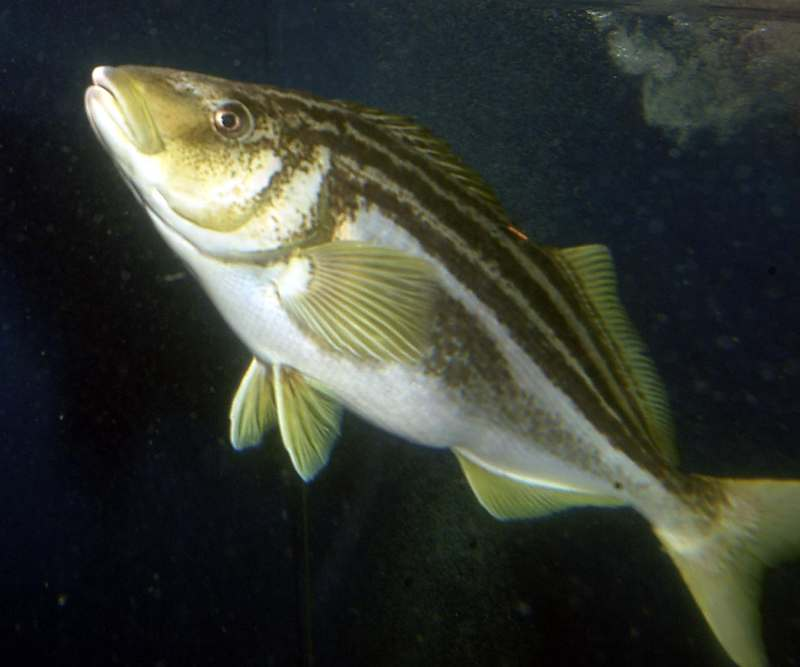Fish Pests and Diseases
Type of resources
Topics
Keywords
Contact for the resource
Provided by
Years
-

This data represents research conducted as part of a PhD project on Striped Trumpeter (Latris lineata). Recorded the prevalence of Kudoa neurophila (a myxozoan parasite formerly known as Pentacapsula neurophila) in relation to age for hatchery reared Striped Trumpeter using histology and PCR testing. Histology and in situ hybridisation techniques were incorporated into the study of the histopathology of the disease caused by this parasite to elucidate its entry point on the fish host and migratory pathway to terminal stage sporulation.
-

Recorded details of visual field ontology (video images recording feeding response and histology of eye and jaw development), behaviour, feeding and jaw development and malformation in larval striped trumpeter (Latris lineata).
-

This data represents research conducted as part of a PhD project on Striped Trumpeter (Latris lineata). As the culture of striped trumpeter moves towards commercial scale grow-out, knowledge of the immune system as it relates to disease resistance and vaccination is becoming more important. This study began at the basic level of immunoglobulin (Ig) characterisation and then moved onto the creation of anti-serum, which was used as an immunological tool to investigate the onset of the antibody response in the striped trumpeter. Information recorded included, the characterisation and immune response of hatchery reared striped trumpeter.
-

This data represents research conducted as part of a PhD project on Striped Trumpeter (Latris lineata). Recorded optimal temperatures and lipid levels in diets, protein levels, growth and survival and body composition analysis for post larval striped trumpeter. Also investigated optimal weaning protocol and recorded post larval metamorphosis data.
-

This data represents research conducted as part of a PhD project on Striped Trumpeter (Latris lineata). Performed morphological histology of swim bladder development in Striped Trumpeter at various ages. Also recorded water temperature, photo period, intensity of light and buoyancy control (in relation to water salinity).
-

Data is primarily volume of eggs (naturally spawned and stripped) taken from different photo-thermal held brood stock groups of Striped Trumpeter (Latris lineata). Supporting data includes feeding, animal health and weight and environmental parameters (water quality).
-

This data represents research conducted as part of a PhD project on Striped Trumpeter (Latris lineata). Recorded taxonomy of copopod parasites and investigated potential treatments over the lifecycle of two parasites: caligus and condracantha, in hatchery reared Striped Trumpeter.
-

Data is primarily fish health reports for hatchery reared striped trumpeter (Latris lineata), including issues relating to bacterial (vibrio), viral (particularly noda virus) and parasitic (parasitic copopods and kuoda) infections. Also included is information on the taxonomy and treatment of parasites.
-

This data represents research conducted as part of a PhD project on Striped Trumpeter (Latris lineata). Knowledge of the microbial bacterial community of the larvae, seawater and live feeds is necessary in order to develop an understanding of what represents a healthy microbial ecology relevant for larval fish rearing success. 16S ribosomal RNA (rRNA) gene-based clone library and terminal restriction fragment length polymorphism (TRFLP) analyses were utilized to examine the microbial community associated with larvae cultured under different “greenwater” conditions and determine the success of probiont application in live feeds used for larval fish rearing. Though water quality was apparently influential on larval survival, no specific bacterial species present either on the larvae or in surrounding tank water could be attributed to reduced survival. Two bacterial strains, Pseudoalteromonas sp. ST8 and Vibrio sp. ST7 were found to inhibit bacteria pathogenic to larval fish through production of extracellular substances. Strain ST8 was found to be compatible with artemia, rotifers and larval fish and outcompeted the fish pathogen Vibrio proteolyticus in competition experiments. Encapsulation experiments indicated strain ST8 was transferrable to artemia and thus represent a potential probiont for larval fish mariculture.
-

This data represents research conducted as part of a PhD project on Striped Trumpeter (Latris lineata). Visual field ontogeny, behaviour and feeding were recorded along with details of jaw development and malformation. Video images were used to record length, feeding response and histology of eye and jaw development.
 IMAS Metadata Catalogue
IMAS Metadata Catalogue